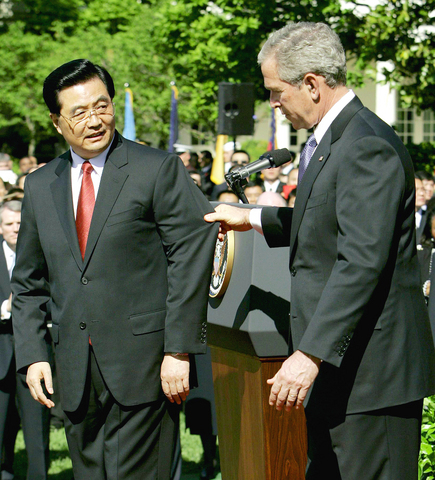Government officials yesterday welcomed US President George W Bush's reiteration of Washington's stance on Taiwan in his talks with Chinese President Hu Jintao (胡錦濤).
Bush met Hu at the White House in Washington on Thursday, where the two leaders discussed a wide range of issues including trade, human rights, nuclear proliferation and Taiwan.
"In his welcome speech on the White House's South Lawn, President Bush reiterated the US commitment to peace across the Taiwan Strait. [Bush said that] the US would uphold its `one China' policy based on the three Sino-US communiques and the Taiwan Relations Act, remained opposed to any side unilaterally changing the status quo, and that Taiwan's future must be resolved peacefully," the Foreign Ministry said in a statement.

PHOTO: EPA
"This shows that the US policy remains consistent and unchanged. This shows that the US takes the issue of peace in the Taiwan Strait seriously and remains committed to preserving that peace," the statement said.
Taiwan watched nervously as Bush and Hu held their summit at the White House, fearing that Bush might publicly criticize President Chen Shui-bian (
Although Bush did not say he was opposed to Taiwanese independence, he did say that he did not support it.
Analysts in Taiwan pointed out that Bush saying "I do not support" did not amount to a declaration of opposition.
Minister of Foreign Affairs James Huang (
Huang commented on Hu's reaction to a question from the press regarding when China would be democratized in which the Chinese president said that he didn't know the definition of "democracy."
"To most people, it's a simple question. Democracy is about people being able to choose their own leader, participate in the policy-making process and that minority opinions are respected and protected," Huang said.
Mainland Affairs Council Deputy Chairman You Ying-lung (游盈隆) said that Bush's remarks that "We [the US] believe the future of Taiwan should be resolved peacefully" dealt a severe blow to China's "Anti-secession" Law.
Premier Su Tseng-chang (蘇貞昌) said he appreciated Bush's support for Taiwan's democracy and maintaining peace across the strait.
While extending gratitude to Bush for reaffirming the US commitment to Taiwan, Democratic Progressive Party (DPP) Chairman Yu Shyi-kun criticized Hu for calling Taiwan "a part of China."
Hu "upheld the `one China' principle, excluding Taiwanese freedom to opt for independence," Yu said.
Chinese Nationalist Party (KMT) Chairman Ma Ying-jeou (馬英九) yesterday said Bush's statement on cross-strait relations was a "reiteration of the common stance shared by seven previous US presidents."
Saying the government's action on the National Unification Council had impacted on US-Taiwan relations, Ma said: "We need to be extra careful because even a seemingly insignificant act of negligence could be interpreted as changing the status quo unilaterally."
Additional reporting by Jimmy Chuang and Mo Yan-chih
Also see stories:
`Bu-Hu' meeting bedeviled by flubs
Chinese media whitewashes Hu visit
Pro-Taiwan demonstrators denounce China's buildup
Meeting with Bush only embarrassed Hu, analysts say

US President Donald Trump yesterday announced sweeping "reciprocal tariffs" on US trading partners, including a 32 percent tax on goods from Taiwan that is set to take effect on Wednesday. At a Rose Garden event, Trump declared a 10 percent baseline tax on imports from all countries, with the White House saying it would take effect on Saturday. Countries with larger trade surpluses with the US would face higher duties beginning on Wednesday, including Taiwan (32 percent), China (34 percent), Japan (24 percent), South Korea (25 percent), Vietnam (46 percent) and Thailand (36 percent). Canada and Mexico, the two largest US trading

ACTION PLAN: Taiwan would expand procurement from the US and encourage more companies to invest in the US to deepen bilateral cooperation, Lai said The government would not impose reciprocal tariffs in retaliation against US levies, President William Lai (賴清德) said yesterday, as he announced five strategies to address the issue, including pledging to increase Taiwanese companies’ investments in the US. Lai has in the past few days met with administrative and national security officials, as well as representatives from various industries, to explore countermeasures after US President Donald Trump on Wednesday last week announced a 32 percent duty on Taiwanese imports. In a video released yesterday evening, Lai said that Taiwan would not retaliate against the US with higher tariffs and Taiwanese companies’ commitments to

‘SPECIAL CHANNEL’: Taipei’s most important tasks are to stabilize industries affected by Trump’s trade tariffs and keep negotiations with Washington open, a source said National Security Council Secretary-General Joseph Wu (吳釗燮) arrived in the US for talks with US President Donald Trump’s administration, a source familiar with the matter said on Friday. Wu was leading a delegation for a meeting known as the “special channel,” the Financial Times reported earlier. It marked Trump’s first use of the channel since returning to the White House on Jan. 20. Citing a source familiar with the matter, the Financial Times reported that Minister of Foreign Affairs Lin Chia-lung (林佳龍) was also a part of the delegation. The visit came days after China concluded war games around Taiwan and amid Trump’s

CHIP EXCEPTION: An official said that an exception for Taiwanese semiconductors would have a limited effect, as most are packaged in third nations before being sold The Executive Yuan yesterday decried US President Donald Trump’s 32 percent tariff on Taiwanese goods announced hours earlier as “unfair,” saying it would lodge a representation with Washington. The Cabinet in a statement described the pledged US tariffs, expected to take effect on Wednesday next week, as “deeply unreasonable” and “highly regrettable.” Cabinet spokeswoman Michelle Lee (李慧芝) said that the government would “lodge a solemn representation” with the US Trade Representative and continue negotiating with Washington to “ensure the interests of our nation and industries.” Trump at a news conference in Washington on Wednesday announced a 10 percent baseline tariff on most goods